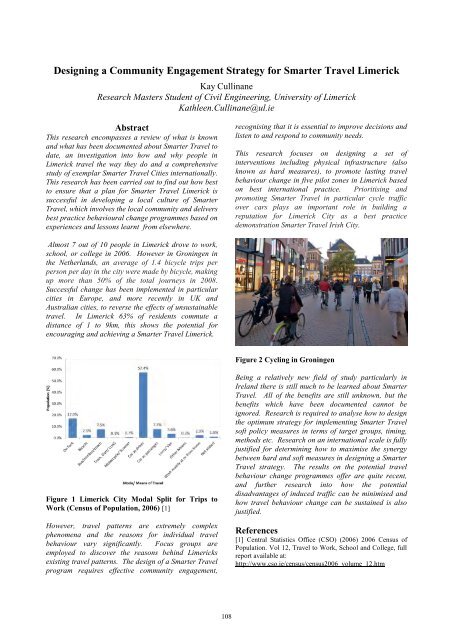NUI Galway – UL Alliance First Annual ENGINEERING AND - ARAN ...
NUI Galway – UL Alliance First Annual ENGINEERING AND - ARAN ...
NUI Galway – UL Alliance First Annual ENGINEERING AND - ARAN ...
You also want an ePaper? Increase the reach of your titles
YUMPU automatically turns print PDFs into web optimized ePapers that Google loves.
Designing a Community Engagement Strategy for Smarter Travel Limerick<br />
Kay Cullinane<br />
Research Masters Student of Civil Engineering, University of Limerick<br />
Kathleen.Cullinane@ul.ie<br />
Abstract<br />
This research encompasses a review of what is known<br />
and what has been documented about Smarter Travel to<br />
date, an investigation into how and why people in<br />
Limerick travel the way they do and a comprehensive<br />
study of exemplar Smarter Travel Cities internationally.<br />
This research has been carried out to find out how best<br />
to ensure that a plan for Smarter Travel Limerick is<br />
successful in developing a local culture of Smarter<br />
Travel, which involves the local community and delivers<br />
best practice behavioural change programmes based on<br />
experiences and lessons learnt from elsewhere.<br />
Almost 7 out of 10 people in Limerick drove to work,<br />
school, or college in 2006. However in Groningen in<br />
the Netherlands, an average of 1.4 bicycle trips per<br />
person per day in the city were made by bicycle, making<br />
up more than 50% of the total journeys in 2008.<br />
Successful change has been implemented in particular<br />
cities in Europe, and more recently in UK and<br />
Australian cities, to reverse the effects of unsustainable<br />
travel. In Limerick 63% of residents commute a<br />
distance of 1 to 9km, this shows the potential for<br />
encouraging and achieving a Smarter Travel Limerick.<br />
Figure 1 Limerick City Modal Split for Trips to<br />
Work (Census of Population, 2006) [1]<br />
However, travel patterns are extremely complex<br />
phenomena and the reasons for individual travel<br />
behaviour vary significantly. Focus groups are<br />
employed to discover the reasons behind Limericks<br />
existing travel patterns. The design of a Smarter Travel<br />
program requires effective community engagement,<br />
108<br />
recognising that it is essential to improve decisions and<br />
listen to and respond to community needs.<br />
This research focuses on designing a set of<br />
interventions including physical infrastructure (also<br />
known as hard measures), to promote lasting travel<br />
behaviour change in five pilot zones in Limerick based<br />
on best international practice. Prioritising and<br />
promoting Smarter Travel in particular cycle traffic<br />
over cars plays an important role in building a<br />
reputation for Limerick City as a best practice<br />
demonstration Smarter Travel Irish City.<br />
Figure 2 Cycling in Groningen<br />
Being a relatively new field of study particularly in<br />
Ireland there is still much to be learned about Smarter<br />
Travel. All of the benefits are still unknown, but the<br />
benefits which have been documented cannot be<br />
ignored. Research is required to analyse how to design<br />
the optimum strategy for implementing Smarter Travel<br />
soft policy measures in terms of target groups, timing,<br />
methods etc. Research on an international scale is fully<br />
justified for determining how to maximise the synergy<br />
between hard and soft measures in designing a Smarter<br />
Travel strategy. The results on the potential travel<br />
behaviour change programmes offer are quite recent,<br />
and further research into how the potential<br />
disadvantages of induced traffic can be minimised and<br />
how travel behaviour change can be sustained is also<br />
justified.<br />
References<br />
[1] Central Statistics Office (CSO) (2006) 2006 Census of<br />
Population. Vol 12, Travel to Work, School and College, full<br />
report available at:<br />
http://www.cso.ie/census/census2006_volume_12.htm
















